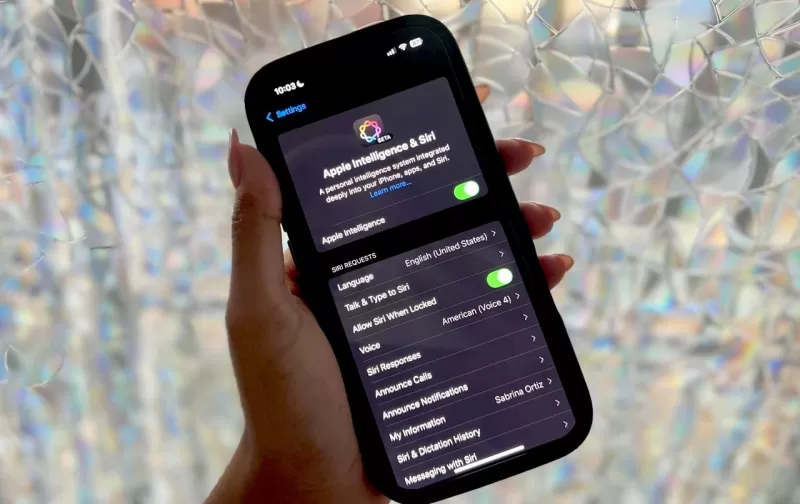Apple Unveils iOS 18.3, Enabling AI-Powered Apple Intelligence by Default

Apple Rolls Out iOS 18.3, iPadOS 18.3, and MacOS 15.3 with Major AI Shift
Apple has just launched iOS 18.3, iPadOS 18.3, and MacOS 15.3, marking a significant shift in how its AI feature, Apple Intelligence, is handled. Previously, users had to manually opt-in to use Apple Intelligence, but with these latest updates, the feature is now enabled by default on eligible devices.
Automatic Enablement for New and Upgrading Users
The release notes for these new OS versions, which hit the market on Monday, confirm that Apple Intelligence will be automatically enabled for new and upgrading users. This means they'll have instant access to the AI-powered features without any extra steps. If you're not keen on using AI, you'll need to turn it off manually.
Eligible Devices for Apple Intelligence
Not every device can tap into Apple Intelligence. You'll need an iPhone 16, an iPhone 15 Pro, an iPhone 15 Pro Max, any iPad Pro or iPad Air with an M1 chip or later, an iPad mini with the A17 Pro chip, or a Mac with an M1 chip or later. It's worth noting that Apple Intelligence now requires about 7GB of storage, up from the initial 4GB. Disabling it won't immediately free up that space, but if you're sure you won't use the AI, you can switch it off by going to Settings, selecting Apple Intelligence & Siri, and toggling off Apple Intelligence.
Additional Updates in the Latest OS Versions
Beyond the AI changes, the new OS updates introduce a few more tweaks. For instance, Apple is now more transparent about AI-generated summaries by italicizing the notice, addressing earlier concerns about clarity. However, due to feedback on the accuracy of news summaries, Apple has temporarily halted notification summaries for news items.
Designed with the iPhone 16 in mind, the visual intelligence feature lets you gather information about people, places, and things you photograph. With iOS 18.3, you can now use this to add events to your calendar from posters or flyers and identify plants and animals.
On the Mac front, MacOS 15.3 introduces Genmoji, allowing you to craft custom emojis based on text descriptions and people from your photo library. Apple also fixed a glitch that stopped you from creating a Genmoji without selecting a different person from your library.
The updates also include 26 security patches, addressing issues in AirPlay, Passkeys, and Safari among others.
While these updates are somewhat minor, bigger changes are on the horizon with iOS/iPadOS 18.4 and MacOS 15.4 expected sometime this spring, likely late March or early April. These upcoming updates are rumored to enhance Siri with on-screen awareness and integration with third-party apps.
Related article
 AI-Powered Cover Letters: Expert Guide for Journal Submissions
In today's competitive academic publishing environment, crafting an effective cover letter can make the crucial difference in your manuscript's acceptance. Discover how AI-powered tools like ChatGPT can streamline this essential task, helping you cre
AI-Powered Cover Letters: Expert Guide for Journal Submissions
In today's competitive academic publishing environment, crafting an effective cover letter can make the crucial difference in your manuscript's acceptance. Discover how AI-powered tools like ChatGPT can streamline this essential task, helping you cre
 US to Sanction Foreign Officials Over Social Media Regulations
US Takes Stand Against Global Digital Content Regulations
The State Department issued a sharp diplomatic rebuke this week targeting European digital governance policies, signaling escalating tensions over control of online platforms. Secretary Marco
US to Sanction Foreign Officials Over Social Media Regulations
US Takes Stand Against Global Digital Content Regulations
The State Department issued a sharp diplomatic rebuke this week targeting European digital governance policies, signaling escalating tensions over control of online platforms. Secretary Marco
 Ultimate Guide to AI-Powered YouTube Video Summarizers
In our information-rich digital landscape, AI-powered YouTube video summarizers have become indispensable for efficient content consumption. This in-depth guide explores how to build a sophisticated summarization tool using cutting-edge NLP technolog
Comments (6)
0/200
Ultimate Guide to AI-Powered YouTube Video Summarizers
In our information-rich digital landscape, AI-powered YouTube video summarizers have become indispensable for efficient content consumption. This in-depth guide explores how to build a sophisticated summarization tool using cutting-edge NLP technolog
Comments (6)
0/200
![JamesBaker]() JamesBaker
JamesBaker
 August 25, 2025 at 1:00:59 AM EDT
August 25, 2025 at 1:00:59 AM EDT
Whoa, Apple flipping the switch to make AI default in iOS 18.3 is bold! 😮 Feels like they're saying, 'Trust us, you’ll love this.' But I’m curious—will users vibe with this or feel it’s too pushy?


 0
0
![GregoryJones]() GregoryJones
GregoryJones
 April 26, 2025 at 1:45:10 PM EDT
April 26, 2025 at 1:45:10 PM EDT
AIがデフォルトで有効になるのは便利だけど、プライバシーの問題が心配です。でも新しい機能は試してみたいですね。


 0
0
![LawrenceJones]() LawrenceJones
LawrenceJones
 April 26, 2025 at 12:06:42 PM EDT
April 26, 2025 at 12:06:42 PM EDT
Me encanta que Apple esté apostando por la inteligencia artificial de forma predeterminada, pero a veces siento que está demasiado metida en mi vida personal.


 0
0
![HarryJones]() HarryJones
HarryJones
 April 25, 2025 at 4:16:03 PM EDT
April 25, 2025 at 4:16:03 PM EDT
ऐपल के आईएआई फीचर को डिफ़ॉल्ट सक्रिय करने का चयन मुझे बहुत पसंद आया। लेकिन कभी-कभी मुझे लगता है कि मेरे जीवन में इसका बहुत ज्यादा हिस्सा है।


 0
0
![WillWalker]() WillWalker
WillWalker
 April 25, 2025 at 2:50:29 PM EDT
April 25, 2025 at 2:50:29 PM EDT
Apple’s move to default-enable AI features is kind of cool but also a bit intrusive. It feels like my phone knows me too well sometimes. Still, super convenient overall!


 0
0
![TimothyBaker]() TimothyBaker
TimothyBaker
 April 25, 2025 at 7:13:13 AM EDT
April 25, 2025 at 7:13:13 AM EDT
苹果这次更新iOS真的让我眼前一亮!默认开启AI功能感觉更智能了,不过有时候觉得有点太主动了,像是在帮我做决定一样。希望未来能有更多自定义选项。


 0
0

Apple Rolls Out iOS 18.3, iPadOS 18.3, and MacOS 15.3 with Major AI Shift
Apple has just launched iOS 18.3, iPadOS 18.3, and MacOS 15.3, marking a significant shift in how its AI feature, Apple Intelligence, is handled. Previously, users had to manually opt-in to use Apple Intelligence, but with these latest updates, the feature is now enabled by default on eligible devices.
Automatic Enablement for New and Upgrading Users
The release notes for these new OS versions, which hit the market on Monday, confirm that Apple Intelligence will be automatically enabled for new and upgrading users. This means they'll have instant access to the AI-powered features without any extra steps. If you're not keen on using AI, you'll need to turn it off manually.
Eligible Devices for Apple Intelligence
Not every device can tap into Apple Intelligence. You'll need an iPhone 16, an iPhone 15 Pro, an iPhone 15 Pro Max, any iPad Pro or iPad Air with an M1 chip or later, an iPad mini with the A17 Pro chip, or a Mac with an M1 chip or later. It's worth noting that Apple Intelligence now requires about 7GB of storage, up from the initial 4GB. Disabling it won't immediately free up that space, but if you're sure you won't use the AI, you can switch it off by going to Settings, selecting Apple Intelligence & Siri, and toggling off Apple Intelligence.
Additional Updates in the Latest OS Versions
Beyond the AI changes, the new OS updates introduce a few more tweaks. For instance, Apple is now more transparent about AI-generated summaries by italicizing the notice, addressing earlier concerns about clarity. However, due to feedback on the accuracy of news summaries, Apple has temporarily halted notification summaries for news items.
Designed with the iPhone 16 in mind, the visual intelligence feature lets you gather information about people, places, and things you photograph. With iOS 18.3, you can now use this to add events to your calendar from posters or flyers and identify plants and animals.
On the Mac front, MacOS 15.3 introduces Genmoji, allowing you to craft custom emojis based on text descriptions and people from your photo library. Apple also fixed a glitch that stopped you from creating a Genmoji without selecting a different person from your library.
The updates also include 26 security patches, addressing issues in AirPlay, Passkeys, and Safari among others.
While these updates are somewhat minor, bigger changes are on the horizon with iOS/iPadOS 18.4 and MacOS 15.4 expected sometime this spring, likely late March or early April. These upcoming updates are rumored to enhance Siri with on-screen awareness and integration with third-party apps.
 AI-Powered Cover Letters: Expert Guide for Journal Submissions
In today's competitive academic publishing environment, crafting an effective cover letter can make the crucial difference in your manuscript's acceptance. Discover how AI-powered tools like ChatGPT can streamline this essential task, helping you cre
AI-Powered Cover Letters: Expert Guide for Journal Submissions
In today's competitive academic publishing environment, crafting an effective cover letter can make the crucial difference in your manuscript's acceptance. Discover how AI-powered tools like ChatGPT can streamline this essential task, helping you cre
 US to Sanction Foreign Officials Over Social Media Regulations
US Takes Stand Against Global Digital Content Regulations
The State Department issued a sharp diplomatic rebuke this week targeting European digital governance policies, signaling escalating tensions over control of online platforms. Secretary Marco
US to Sanction Foreign Officials Over Social Media Regulations
US Takes Stand Against Global Digital Content Regulations
The State Department issued a sharp diplomatic rebuke this week targeting European digital governance policies, signaling escalating tensions over control of online platforms. Secretary Marco
 Ultimate Guide to AI-Powered YouTube Video Summarizers
In our information-rich digital landscape, AI-powered YouTube video summarizers have become indispensable for efficient content consumption. This in-depth guide explores how to build a sophisticated summarization tool using cutting-edge NLP technolog
Ultimate Guide to AI-Powered YouTube Video Summarizers
In our information-rich digital landscape, AI-powered YouTube video summarizers have become indispensable for efficient content consumption. This in-depth guide explores how to build a sophisticated summarization tool using cutting-edge NLP technolog
 August 25, 2025 at 1:00:59 AM EDT
August 25, 2025 at 1:00:59 AM EDT
Whoa, Apple flipping the switch to make AI default in iOS 18.3 is bold! 😮 Feels like they're saying, 'Trust us, you’ll love this.' But I’m curious—will users vibe with this or feel it’s too pushy?


 0
0
 April 26, 2025 at 1:45:10 PM EDT
April 26, 2025 at 1:45:10 PM EDT
AIがデフォルトで有効になるのは便利だけど、プライバシーの問題が心配です。でも新しい機能は試してみたいですね。


 0
0
 April 26, 2025 at 12:06:42 PM EDT
April 26, 2025 at 12:06:42 PM EDT
Me encanta que Apple esté apostando por la inteligencia artificial de forma predeterminada, pero a veces siento que está demasiado metida en mi vida personal.


 0
0
 April 25, 2025 at 4:16:03 PM EDT
April 25, 2025 at 4:16:03 PM EDT
ऐपल के आईएआई फीचर को डिफ़ॉल्ट सक्रिय करने का चयन मुझे बहुत पसंद आया। लेकिन कभी-कभी मुझे लगता है कि मेरे जीवन में इसका बहुत ज्यादा हिस्सा है।


 0
0
 April 25, 2025 at 2:50:29 PM EDT
April 25, 2025 at 2:50:29 PM EDT
Apple’s move to default-enable AI features is kind of cool but also a bit intrusive. It feels like my phone knows me too well sometimes. Still, super convenient overall!


 0
0
 April 25, 2025 at 7:13:13 AM EDT
April 25, 2025 at 7:13:13 AM EDT
苹果这次更新iOS真的让我眼前一亮!默认开启AI功能感觉更智能了,不过有时候觉得有点太主动了,像是在帮我做决定一样。希望未来能有更多自定义选项。


 0
0





























